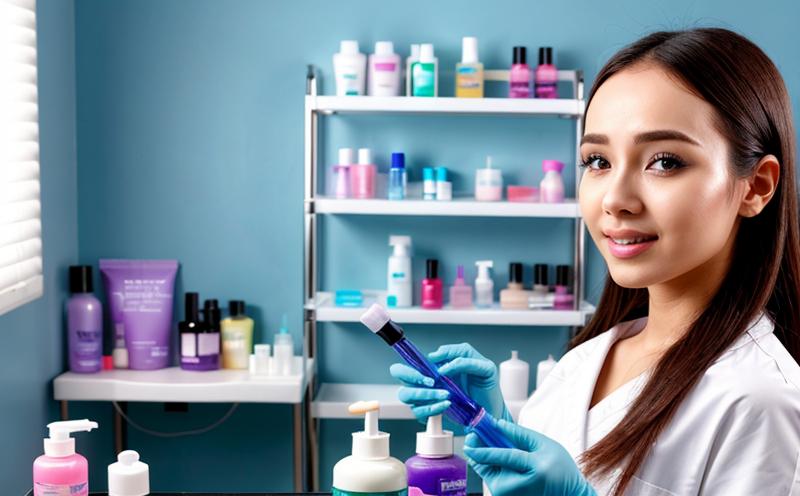EN 15789 Vibrio Detection Testing in Personal Care Products
The European Standard EN 15789:2004 is specifically designed to address the detection of Vibrio species, particularly V. vulnificus, in cosmetic and personal care products. This standard is crucial for ensuring product safety by minimizing the risk of contamination that could lead to serious health issues, especially for individuals with compromised immune systems.
The presence of Vibrio species in cosmetic products can be a significant concern due to their potential to cause infections such as gastroenteritis or wound infections. The standard provides detailed guidelines on the microbiological examination and control measures that manufacturers must implement during production, storage, and handling processes.
The testing process involves the following steps:
- Sampling of the cosmetic product
- Preliminary identification to rule out non-pathogenic organisms
- Culture-based methods or molecular techniques for Vibrio species detection
The significance of this testing extends beyond product safety; it also supports consumer confidence in the brand and helps maintain a positive reputation. Non-compliance can result in severe penalties, recalls, and damage to brand image.
Our laboratory utilizes advanced techniques such as Vibrio-specific PCR (Polymerase Chain Reaction) assays and culture-based methods to detect Vibrio species accurately. This approach ensures that even trace amounts of the pathogen are not overlooked, providing a robust defense against contamination.
The impact of this testing on the market is substantial. Compliance with EN 15789 helps companies avoid legal issues and potential product recalls. It also enhances consumer trust, which can lead to increased sales and brand loyalty. By adhering to these standards, manufacturers demonstrate their commitment to quality and safety, aligning closely with regulatory expectations.
Why It Matters
The detection of Vibrio species in personal care products is not just a compliance issue; it has significant implications for public health. The presence of these microorganisms can lead to severe infections, particularly among immunocompromised individuals such as elderly patients and those with chronic diseases.
In addition to the direct health risks, non-compliance with EN 15789 can result in legal consequences, including fines and product recalls. This can severely impact a company's reputation and financial stability. The standards outlined by this regulation are designed to protect consumers and ensure that products meet the highest safety standards.
Compliance with these regulations is essential for maintaining consumer trust and confidence. In an increasingly competitive market, brands that prioritize safety and quality are more likely to succeed. By adhering to EN 15789, companies can differentiate themselves in the market, attracting health-conscious consumers who value product integrity.
The testing process ensures that products are free from harmful microorganisms, thereby protecting the end-user. This is particularly important for personal care items that come into direct contact with skin and mucous membranes, as these areas are more susceptible to infection.
Scope and Methodology
The scope of EN 15789 includes the microbiological examination of cosmetic and personal care products for the presence of Vibrio species. This standard applies to both finished products and raw materials used in their production.
The methodology outlined in this standard involves several key steps:
- Sampling: Samples are taken from various points in the manufacturing process, including raw materials and final products.
- Culture-Based Identification: Traditional culture-based methods are used to isolate and identify Vibrio species.
- Molecular Techniques: PCR assays specific for Vibrio species are employed to detect even trace amounts of the pathogen.
The culture-based methods involve incubating samples under conditions favorable for Vibrio growth, followed by biochemical tests to confirm identification. The molecular techniques provide a more sensitive and specific approach to detection.
The acceptance criteria stipulate that no Vibrio species should be detected in the final product. Compliance with these standards ensures that products are safe for use and meet regulatory requirements.
Competitive Advantage and Market Impact
- Enhanced Consumer Trust: Compliance with EN 15789 enhances consumer trust, leading to increased sales and brand loyalty.
- Avoidance of Legal Issues: By adhering to this standard, companies can avoid legal consequences such as fines and product recalls.
- Differentiation in the Market: Brands that prioritize safety and quality are more likely to succeed in a competitive market. Compliance with EN 15789 helps differentiate products from those of competitors.
- Positive Reputation: Adherence to these standards enhances a company's reputation, making it an attractive choice for consumers who value product integrity.
The impact on the market is substantial. Brands that comply with EN 15789 are more likely to attract health-conscious consumers who prioritize safety and quality in their personal care products. This can lead to increased sales and a stronger brand image, ultimately contributing to long-term success in the industry.





